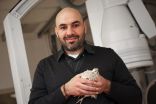(Press-News.org) Johns Hopkins computers scientists, who have already used Twitter posts to track flu cases, say their techniques also show promise as a tool to gather important information about some common mental illnesses.
By reviewing tweets from users who publicly mentioned their diagnosis and by looking for language cues linked to certain disorders, the researchers say, they've been able to quickly and inexpensively collect new data on post-traumatic stress disorder, depression, bipolar disorder and seasonal affective disorder.
In research presented at three scientific conferences this year, the scholars described how their techniques of mining public data have yielded fresh numbers on cases of these illnesses, allowing for analyses that were previously difficult or expensive to obtain. The scholars emphasized, however, that their findings did not disclose the names of people who publicly tweeted about their disorders.
The researchers said their goal is to share with treatment providers and public health officials some timely additional information about the prevalence of certain mental illnesses. Using computer technology to sift through tweets, they said, can help address the slow pace and high costs associated with collecting mental heath data through surveys and other traditional methods.
"With many physical illnesses, including the flu, there are lots of quantifiable facts and figures that can be used to study things like how often and where the disease is occurring, which people are most vulnerable and what treatments are most successful," said Glen Coppersmith, a Johns Hopkins senior research scientist who has played a key role in the project. "But it's much tougher and more time-consuming to collect this kind of data about mental illnesses because the underlying causes are so complex and because there is a long-standing stigma that makes even talking about the subject all but taboo."
Coppersmith, who is affiliated with the university's Center for Language and Speech Processing and its Department of Applied Mathematics and Statistics, added, "We're not aiming to replace the long-standing survey methods of tracking mental illness trends. We believe our new techniques could complement that process. We're trying to show that analyzing tweets could uncover similar results, but could do so more quickly and at a much lower cost."
Earlier this year, Coppersmith, with Johns Hopkins colleagues Mark Dredze and Craig Harman, presented two papers describing their methods at two professional conferences in Baltimore and Ann Arbor, Mich.
Also, in August, at the Joint Statistical Meetings in Boston, Coppersmith and colleagues from the U.S. Naval Surface Warfare Center spoke about their promising early results in an ongoing study that uses Twitter posts to study mental illness in particular geographic areas.
Their analyses indicated that PTSD was more prevalent at military installations that frequently deployed during the recent Iraq and Afghanistan conflicts, and that signs of depression were more evident in locations with higher unemployment rates. While neither of these findings is surprising, they demonstrate that analyzing Twitter posts could become a useful yardstick in quickly measuring mental health trends, particularly after dramatic events such as natural disasters and military conflicts.
The computer algorithms used to discover mental health data from tweets look for words and language patterns associated with these ailments, including word cues linked to anxiety and insomnia, and phrases such as "I just don't want to get out of bed." The formula for zeroing in on mental health cases was based on a review of more than 8 billion tweets. The technique is built upon earlier Johns Hopkins work led by Dredze that successfully used Twitter posts to track outbreaks of the flu.
"Using Twitter to get a fix on mental health cases could be very helpful to health practitioners and governmental officials who need to decide where counseling and other care is needed most," said Dredze, an assistant research professor in the Whiting School of Engineering's Department of Computer Science. "It could point to places where many veterans may be experiencing PTSD, for example, or to towns where people have been traumatized by a shooting spree or widespread tornado damage."
The idea has begun to generate some positive attention. After a recent conference presentation on the team's social media research, an editorial in the Boston Globe stated, "Twitter is, apparently, the quiet therapist to whom we reveal much more that we realize. As such, it could be a valuable public-health tool. More work needs to be done in considering how such information could be used while still preserving privacy, but it's an inquiry worth pursuing."
A recent Newsweek article on new high-tech methods of tracking mental health trends also quoted Coppersmith as saying, "Mental health is something that has touched every single one of us at some point in our lives, whether it's a personal experience or watching family or friends go through it. I don't know how you can't attack this problem. This is the one everyone should care about."
In November, the Johns Hopkins team hosted a 48-hour hack-a-thon, bringing together scholars from six universities and a handful of industry partners to foster collaboration and innovation on these topics. The hack-a-thon was organized to prepare for the second Computational Linguistics and Clinical Psychology workshop, which will be held in Denver next spring in conjunction with the 2015 Conference of the North American Chapter of the Association for Computational Linguistics. Coppersmith and Dredze will serve on the program and organization committee, headed by a previous Johns Hopkins post-doctoral researcher, Margaret Mitchell, now at Microsoft Research.
INFORMATION:
Related links:
Whiting School of Engineering: http://engineering.jhu.edu
Johns Hopkins' Department of Computer Science: http://www.cs.jhu.edu/
Center for Language and Speech Processing: http://www.clsp.jhu.edu
Mark Dredze's Social Media and Health Research Group:
http://www.socialmediahealthresearch.org/
Take a look in your pantry: the miracle ingredient for fighting obesity may already be there. A simple potato extract may limit weight gain from a diet that is high in fat and refined carbohydrates, according to scientists at McGill University. The results of their recent study were so surprising that the investigators repeated the experiment just to be sure.
Investigators fed mice an obesity-inducing diet for 10 weeks.
The results soon appeared on the scale: mice that started out weighing on average 25 grams put on about 16 grams. But mice that consumed the same diet ...
This news release is available in French. Montreal, December 9, 2014 -- With the holidays around the corner, we're all a little more likely to indulge, especially when it comes to alcohol. While a few extra drinks might be brushed off as holiday cheer, they can actually signal a problem in young adults.
That's because the bad habits we pick up in our youth may stay with us later in life, according to a new study from Concordia, in collaboration with the Université de Montréal and University of Massachusetts.
Its findings, which were published recently ...
Smaller recurring donations are generally more beneficial to a non-profit than larger, one-time donations, yet non-profits struggle to convince donors to move beyond one-time contributions. According to a new study in the Journal of Marketing Research, if donors believe that upgrading to a recurring donation will result in a matching donation, many will make the leap.
"Imagine you are given the option to upgrade to a recurring donation. Now imagine that the charity will match all donations made that day, if and only if 75% of donors agree to upgrade to a recurring donation. ...
Dinosaurs did it. Human beings and monkey do it. And even birds do it. They walk on two legs. And although humans occupy a special position amongst mammals as they have two legs, the upright gait is not reserved only for man. In the course of evolution many animals have developed the bipedal gait - the ability to walk on two legs.
"Birds are moving forward on two legs as well, although they use a completely different technique from us humans," Dr. Emanuel Andrada from the Friedrich Schiller University in Jena (Germany) says. Human beings keep their upper bodies generally ...
UCL scientists have shown how advanced computer simulations can be used to design new composite materials. Nanocomposites, which are widely used in industry, are revolutionary materials in which microscopic particles are dispersed through plastics. But their development until now has been largely by trial and error.
The 'virtual lab' developed using supercomputer simulations greatly improves scientists' understanding of how composite materials are built on a molecular level. They allow the properties of a new material to be predicted based simply on its structure and ...
A new study shows that college students in online courses give better evaluations to instructors they think are men - even when the instructor is actually a woman.
"The ratings that students give instructors are really important, because they're used to guide higher education decisions related to hiring, promotions and tenure," says Lillian MacNell, lead author of a paper on the work and a Ph.D. student in sociology at NC State. "And if the results of these evaluations are inherently biased against women, we need to find ways to address that problem."
To address whether ...
Reston, Va. (December 9, 2014) - Cancer therapy can be much more effective using a new way to customize nuclear medicine treatment, researchers say in the December 2014 issue of The Journal of Nuclear Medicine. The process could also be useful for other diseases that could benefit from targeted radiation.
Targeted therapy with radiopharmaceuticals--radioactive compounds used in nuclear medicine for diagnosis or treatment--has great potential for the treatment of cancer, especially for cancer cells that have migrated from primary tumors to lymph nodes and secondary organs ...
PROVIDENCE, R.I. [Brown University] -- Maybe distraction is not always the enemy of learning. It turns out in surprising Brown University psychology research that inconsistent distraction is the real problem. As long as our attention is as divided when we have to recall a motor skill as it was when we learned it, we'll do just fine, according to the new study.
Most learned motor tasks -- driving, playing sports or music, even walking again after injury -- occur with other things going on. Given the messiness of our existence, said lead researcher Joo-Hyun Song, assistant ...
This news release is available in German.
Not all boreholes are the same. Scientists of the Karlsruhe Institute of Technology (KIT) used mobile measurement equipment to analyze gaseous compounds emitted by the extraction of oil and natural gas in the USA. For the first time, organic pollutants emitted during a fracking process were measured at a high temporal resolution. The highest values measured exceeded typical mean values in urban air by a factor of one thousand, as was reported in ACP journal.
(DOI 10.5194/acp-14-10977-2014)
Emission of trace gases by ...
TORONTO - Dec. 9, 2014 (Toronto) - Scientists at the Centre for Addiction and Mental Health (CAMH) have identified a novel drug target that could lead to the development of better antipsychotic medications.
Dr. Fang Liu, Senior Scientist in CAMH's Campbell Family Mental Health Research Institute and Professor in the Department of Psychiatry, University of Toronto, and her team published their results online in the journal Neuron.
Current treatment for patients with schizophrenia involves taking medications that block or interfere with the action of the neurotransmitter ...




